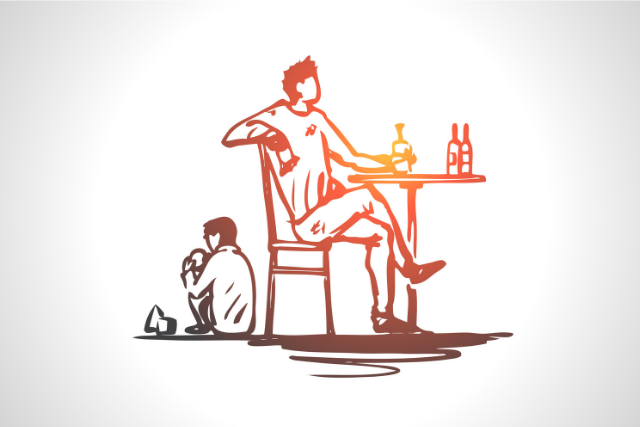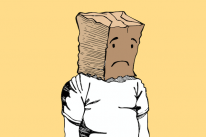
“You could have grown cold, but you grew courageous instead. You could have given up, but you kept on going. You could have seen obstacles, but you called them adventures. You could have called them weeds, but instead you called them wildflower. You could have died a caterpillar, but you fought on to be a butterfly. You could have denied yourself goodness, but instead you chose to show yourself some self-love. You could have defined yourself by the dark days, but instead through them you realized your light.” ~S.C. Lourie
I recently read a message written by Kirk Franklin: “Two twin boys were raised by an alcoholic father. One grew up to be an alcoholic and when asked what happened, he said, ‘I watched my father.’ The other grew up and never drank in his life. When he was asked what happened, he said, ‘I watched my father.’ Two boys, same dad, two different perspectives. Your perspective in life will determine your destiny.”
In a study, it was reported that a child of an alcoholic is eight times more likely to develop an addiction than a child who doesn’t grow up with an alcoholic parent.
I have spoken with various people who have said something along the lines of “My grandpa struggled with an addiction, my dad struggled with an addiction, so it was inevitable that I would too.”
Let me stop you right there and tell you that you absolutely have the power to stop the cycle.
I grew up with a dad who battled substance abuse, and I learned at an early age that I had a choice when it came to how I was going to live my own life.
Would I step into the same habits and live with a victim mentality believing that I had no other options? Or, would I step forward knowing I have the power to create my life for myself?
I don’t know who needs to hear this today, but it needs to be known that the struggle you have seen in your family does not need to be your own.
For many families across the country, the struggle of addiction is a difficult cycle to break, but it’s not impossible.
Don’t allow the world to make you believe that just because your parent, grandparent, uncle/aunt struggled that means you have to live out your days struggling too. It doesn’t need to define who you are and what you do. You have the power to break the cycle and start a new beginning for your family. Here’s how.
Focus on the things you can control.
Each day we have a choice. We can take steps to move forward with purpose or stay rooted in past hurt. We may not have control over everything that happens in our life, but we do have control over how we respond.
You may not be able to control the person you love who struggles with the addiction, but you are in charge of yourself—and how you allow it to impact you.
No matter how much you want to, you cannot change the people around you. You can only control your own thoughts, actions, and reactions.
Recognize that you can choose to respond to the pain of living with an addict by continuing the cycle of addiction—or you can be the one who ends it. You can learn from their mistakes, find healthier ways to cope with your feelings, and live a life of your own choosing.
Let other people in.
Seeing a loved one struggle with an addiction can leave a lasting impression and impact your life in many ways you may not realize. You may even attempt to sweep your feelings under the rug. Instead of trying to erase painful memories, seek professional guidance from an individual or group who can relay to you that you’re not alone and you have support.
For many years, I felt as though I was the only person I knew who had a parent struggling with an addiction. When I finally garnered up the courage, I decided to attend a community event for families impacted by addiction.
It was incredibly eye-opening to better understand my dad’s battle with substance abuse. It also allowed me to connect and learn from other people my age on a deeper level, while releasing the belief that I was alone in what I had experienced.
Turn your pain into purpose.
Your family’s history of addiction can cause embarrassment, pain, and confusion. Witnessing someone you love fall victim to substance abuse can fuel an array of emotions—from anger to disbelief and disappointment. If you don’t address your feelings head on, you’re likely to look for ways to suppress them.
So, instead of numbing your pain, turn it into purpose.
It takes a lot of strength to stop the cycle of addiction and start fresh. Sharing your experience with others can help inspire those standing in your shoes. Your story has a message of courage and hope that can make a difference in many lives.
It took me nearly thirty years to get to a place where I knew it was time to share my story about my dad’s struggle with substance abuse. I held it inside because of shame, guilt, and a fear that others would judge me because of the stigma of addiction.
When I found myself in a space of being able to share my story, many people began openly sharing their experience with it too. We never know what someone else is struggling with. and we never know how our story might help or inspire them. Those words “me too” offer others peace of mind, reminding them they aren’t alone.
Let go to set yourself free.
One of the greatest traits a person can have is the ability to forgive themselves and others. Unfortunately, what happens all too often is a person will go through life carrying extra baggage that has been weighing on them for years, and at times, even decades.
I have spoken with many people who battle addiction, and they often talk about how much hurt they feel someone inflicted on them and how they turned to their addiction to numb the pain.
Resentment and unwillingness to forgive will keep you locked in the past and prevent you from moving forward with your life. Remember: When you forgive, you aren’t doing it for the other person; you’re doing it to set yourself free.
I know what you are thinking: “But you don’t know what they’ve done to me.”
Forgiveness does not mean that you are excusing their behavior; it means you quit replaying it in your mind and giving it time and emotional energy.
You can carry unforgiveness, but it will cost you joy.
You can carry bitterness, but it will cost you peace.
You may think they don’t deserve to be forgiven, maybe not, but you deserve relief.
As Carl Jung said, “I am not what happened to me. I am what I choose to become.”
About Ashley Surma
Ashley Surma is the founder of For The Good, a community created to elevate and empower you to live a purpose-driven life. She co-hosts the For The Good podcast with her husband Jordan. She is currently writing a book focused on the power of resiliency and how to transform pain into purpose. You can connect with her on Instagram at Instagram.com/forthegoodofficial and instragram/ashsurma or on Facebook.













 Though I run this site, it is not mine. It's ours. It's not about me. It's about us. Your stories and your wisdom are just as meaningful as mine.
Though I run this site, it is not mine. It's ours. It's not about me. It's about us. Your stories and your wisdom are just as meaningful as mine.
Me too!
I’ve been in Al-anon for over 20 years and am so very grateful for the program and the people in the program!